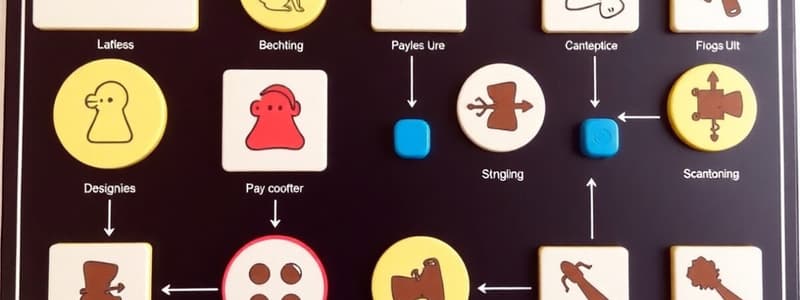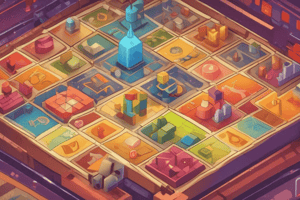Podcast
Questions and Answers
What defines play according to the definitions presented?
What defines play according to the definitions presented?
- Play is a structured activity without rules.
- Play is a competitive activity always involving others.
- Play is executed within certain fixed limits of time and place, according to rules that are optional.
- Play occurs spontaneously and for its own sake. (correct)
Which term best describes games that are designed with predetermined rules?
Which term best describes games that are designed with predetermined rules?
- Paidia
- Mimicry
- Agon
- Ludus (correct)
Which of the following elements is NOT part of the definition of a game?
Which of the following elements is NOT part of the definition of a game?
- Meaningful choices
- Structured conflict
- Open-ended exploration (correct)
- Unequal outcomes
According to Caillois, what aspect is emphasized in games classified under 'Alea'?
According to Caillois, what aspect is emphasized in games classified under 'Alea'?
What does 'lusory attitude' refer to in the context of gaming?
What does 'lusory attitude' refer to in the context of gaming?
Which of the following best describes 'play' as referred to in the content?
Which of the following best describes 'play' as referred to in the content?
Which of the following statements is consistent with the views of Friedrich Schiller on play?
Which of the following statements is consistent with the views of Friedrich Schiller on play?
What is meant by 'contextual' in the context of play?
What is meant by 'contextual' in the context of play?
¿Cuál de las siguientes definiciones se refiere a un juego según los autores mencionados?
¿Cuál de las siguientes definiciones se refiere a un juego según los autores mencionados?
Según Vygotsky, ¿qué papel tiene el juego en el desarrollo infantil?
Según Vygotsky, ¿qué papel tiene el juego en el desarrollo infantil?
¿Cuál de las siguientes dimensiones define la categoría de 'Agon' en los juegos?
¿Cuál de las siguientes dimensiones define la categoría de 'Agon' en los juegos?
¿Qué significa 'lusory attitude' en el contexto del juego?
¿Qué significa 'lusory attitude' en el contexto del juego?
¿Cómo se diferencia 'Ludus' de 'Paidia' en la conceptualización del juego?
¿Cómo se diferencia 'Ludus' de 'Paidia' en la conceptualización del juego?
¿Cuál de las siguientes afirmaciones sobre el juego es FALSA?
¿Cuál de las siguientes afirmaciones sobre el juego es FALSA?
¿Qué autor describe el juego como una experiencia creada por reglas?
¿Qué autor describe el juego como una experiencia creada por reglas?
En la visión de Caillois, ¿cuál de los siguientes tipos de juegos implica la suerte?
En la visión de Caillois, ¿cuál de los siguientes tipos de juegos implica la suerte?
Según Huizinga, el juego se caracteriza por ser una actividad que:
Según Huizinga, el juego se caracteriza por ser una actividad que:
¿Qué aspecto se considera como parte de la definición de un juego en el contexto de la actividad recreativa?
¿Qué aspecto se considera como parte de la definición de un juego en el contexto de la actividad recreativa?
Flashcards are hidden until you start studying
Study Notes
What is a Game?
- Play is a spontaneous activity for its own sake.
- Play creates a zone of proximal development for children as they engage in activities beyond their usual age.
- Play is comprised of free movement within set, rigid structures.
- Games are structured conflicts that engage players within a closed system, ultimately resulting in an unequal outcome.
- Games are a series of meaningful choices.
- Games are domains of contrived contingency that produce interpretable outcomes.
- Games are problem-solving activities approached with a playful attitude.
- Games are voluntary actions performed within limitations of time and space, following agreed upon rules, and have a distinct difference from "ordinary life."
Game Categorizations
- Agon/Competition: Games that involve a contest or competition.
- Alea/Chance: Games that rely on chance or luck.
- Mimicry/Simulation: Games that involve assuming different roles or imitating something.
- Ilinx/Vertigo: Games that involve a sense of disorientation or dizziness.
Game & Play
- Ludus (Games) are hard-coded with rules set from the beginning, while Paidia (Play) are soft-coded where rules are developed during play.
Game Elements
- Pre-lusory Goal: A goal set before the game begins, providing the context for play.
- Constitutive Rules: Rules that define and govern gameplay to manage play.
- Lusory Attitude: The player's willingness to voluntarily overcome unnecessary obstacles to play.
What is a Game?
- Play is a voluntary activity with set limits of time and place, following freely accepted rules, with an aim in itself and accompanied by a feeling of tension, joy, and the consciousness of being different from "ordinary life". (Huizinga, 1938)
- Game is a closed, formal system that engages players in a structured conflict and resolves with an unequal outcome. (Tracy Fullerton, Chris Swain, and Steven Hoffman)
Defining Play
- Play is the aimless expenditure of exuberant energy. (Friedrich Schiller)
- Play is whatever is done spontaneously and for its own sake. (George Santayana)
- Play creates a zone of proximal development for children, allowing them to behave beyond their average age. (Lev Vygotsky)
- Play is free movement within a more rigid structure. (Katie Salen & Eric Zimmerman)
Defining Games
- A game is a series of meaningful choices. (Sid Meier)
- A game is a domain of contrived contingency that generates interpretable outcomes. (Thomas Mallaby)
- A game is a problem-solving activity approached with a playful attitude. (Jesse Schell)
- A game is an experience created by rules. (Anna Anthropy)
Play and its Categories
- Caillois categorized play into four main categories:
- Agôn: Competition
- Alea: Chance
- Mimicry: Simulation
- Ilinx: Vertigo
Game Types
- Ludus: "Hard-coded" games where rules are set from the beginning and the game was designed before playing.
- Paidia: "Soft-coded" games where rules are created during playing time or are just frameworks. These games are:
- Contextual
- Carnivalesque
- Appropriative
- Disruptive
- Autotelic
- Creative
- Personal
Elements of a Game
- Pre-Lusory Goal: The desired outcome of the game
- Constitutive Rules: The rules that define the game and how it is played
- Lusory Attitude: The player's willingness to voluntarily overcome unnecessary obstacles in order to achieve the game's goal.
Studying That Suits You
Use AI to generate personalized quizzes and flashcards to suit your learning preferences.





